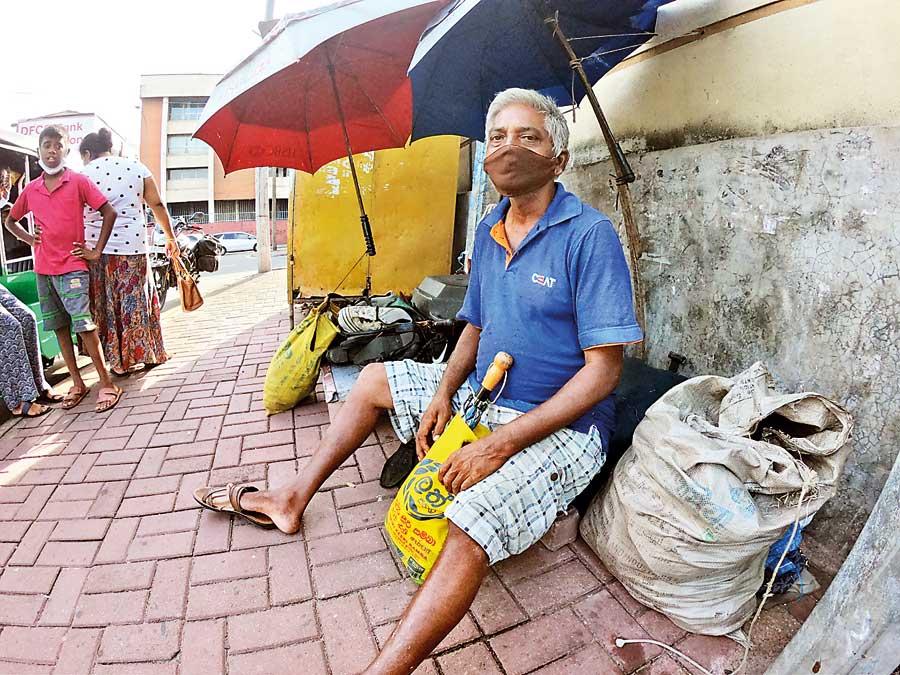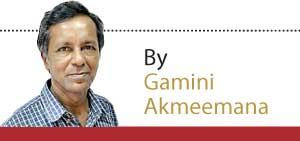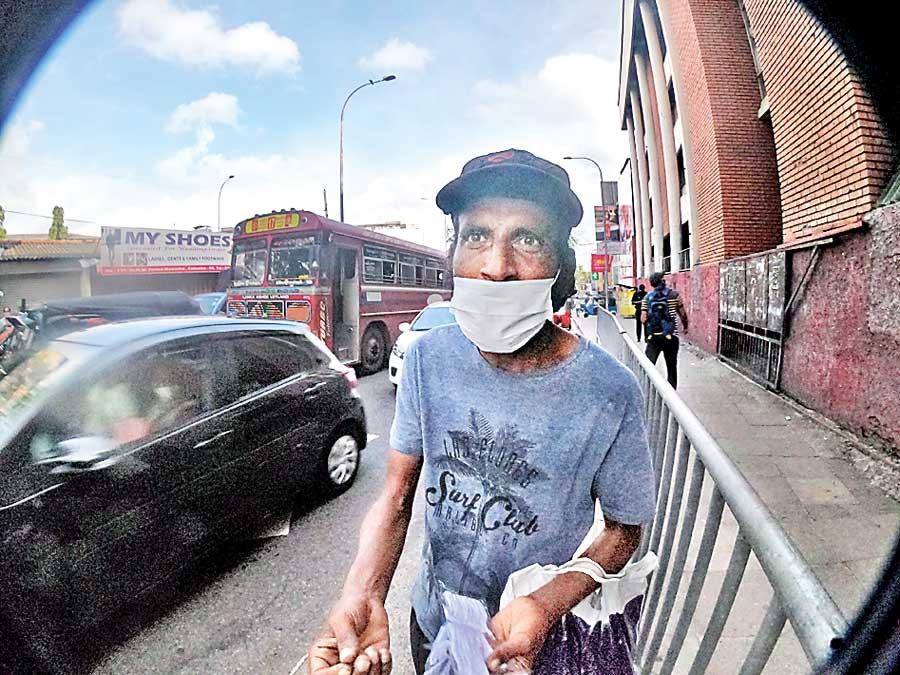02 Nov 2020 - {{hitsCtrl.values.hits}}
‘Coronavirus diary - 8’

The cobbler’s lot looks worse. It stands to reason that, with Covid 19 belt tightening, many would hang onto their old footware as long as they can, which means work for cobblers. Pix by Gamini Akmeemana
The human mind survives, even thrives, on an age-old but simple mechanism called complacency. Even  when things look pretty bad, it keeps saying, no, it can’t happen to you.
when things look pretty bad, it keeps saying, no, it can’t happen to you.
Even as sectors of Colombo barely two kilometers away from my home came under lockdown, my mind wasn’t fully prepared for that eventuality – that where I live will come under lockdown. We will be bypassed by Covid-19, we will somehow be spared. But lockdown came suddenly, as swiftly as dusk falls these days, on the afternoon of Sunday October 25. The radio announced that curfew will be imposed in Colombo 8 at 6.00 pm.
To avoid confusion, what we have here is legally and technically a curfew, not lockdown. But the latter word is current all over the world where Covid-19 is spreading, and the differences between curfew and lockdown can blur. For example, during lockdown people are expected not to exit a specific area, but essential services such as groceries and pharmacies remain open. Residents can exit their homes and localities with a special permit. This is similar to our curfew, because some essential services operate within that and people can obtain curfew passes in some cases.
Waking up to reality can be painful. It’s also time consuming. You want to buy extra quantities of essentials before the crisis becomes full blown. But your capacity to do this has been bludgeoned by the post-Covid-19 economy. When you realize that all supermarkets and groceries in the area will close at six, and you don’t know when they will re-open, you know that you can’t survive for long with what you have.
Therefore, you rush to the nearest supermarket, and there is already a queue, waiting to get in. People are orderly. The panic felt inside does not yet have occasion to announce itself boldly outside. You try to work out the grocery list. Sugar, you have enough for a month. Coffee, too, could last long. Since you need that cup of coffee in the morning, you’ve got enough coffee to last a month.
But other things are lacking. Even salt is in short supply. But, as you wait there, your own mind begins to override the groceries. It wants answers to greater questions. During the last lockdown lasting two months, you overcame daily despair by reaching out to people. You phoned them till your money ran out, you helped those less well off as much as you could. You even made sure the neighbourhood street dogs and cats didn’t starve.
But it’s different this time. You want to reach out, but it will have to be in other ways because your resources have diminished drastically. What exactly do you tell someone starving? That old complacency kicks in here and someone will tell you that people aren’t starving, they’ll ‘somehow’ manage.
Compassion fatigue isn’t anything new in this country. We are starved of compassion, too. Those who appreciate their personal liberties as citizens have bigger worries right now than Covid-19. The latter is a virus that most can survive if they receive medical care. The threat hanging over personal freedoms is deadlier and will outlast Coronavirus.
Yesterday, Chileans voted by a huge margin to replace the constitution introduced by Gen. Agusto Pinochet.78% of the people voted for the change. It took more than 40 years – an entire generation – for the call for change to gather enough steam.
In Sri Lanka, too, it could quite a long time for people to realize the dangers of the mandate they had given to this government. By then, the children of these voters would have paid bitterly for their parents’ mistake (though Pinochet was a brutal dictator, he was popular with the middle and upper classes who hated Allende’s socialism and worker-oriented politics).
Covid-19 has put individual rights on the backseat. But, to the men in these photographs – the man selling wicks at traffic lights, and the cobbler sweating it out under his umbrella – it’s the daily bread that’s important, and that has already become a struggle.
When he saw my camera, the man selling wicks came and spoke to me. He wanted me to take his picture and his tell story to the world. This surprised me, since normally such people are camera shy.
He said he used to sell books but switched to wicks as that got harder and harder.
“I don’t want to tell you how I ended up begging in the streets,” he told me. “I have no one. If I can’t get any money doing this in the streets, I’m going to starve.”
Things are bad, because the people who helped him with Rs. 10 or 20 are now afraid to roll down their windows when he comes near. They are afraid of the virus.
The town centre was under curfew but there’s enough traffic passing through, and there’s a long wait at the traffic lights. But few have the courage to roll down their windows to help a hungry man.
The cobbler’s lot looks worse. It stands to reason that, with Covid-19 belt tightening, many would hang onto their old footwear as long as they can, which means work for cobblers. But the streets are going to be empty for a while.
I asked the man what he was going to do if the curfew lasted two weeks or more.
He shrugged and said there was nothing he could do unless someone helped.
But who’s going to help? The kind of people he meets are fast running out of resources. Those above do not care by and large.
And, Covid -19, simply keeps spreading and spreading.

30 Nov 2024 14 minute ago
30 Nov 2024 2 hours ago
30 Nov 2024 5 hours ago
30 Nov 2024 6 hours ago
30 Nov 2024 9 hours ago